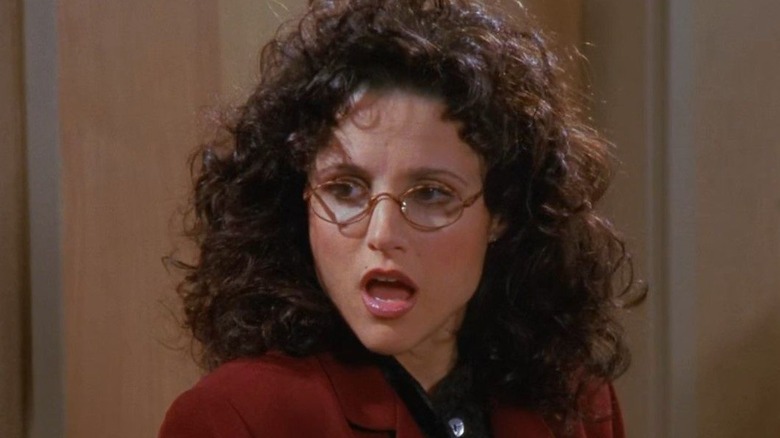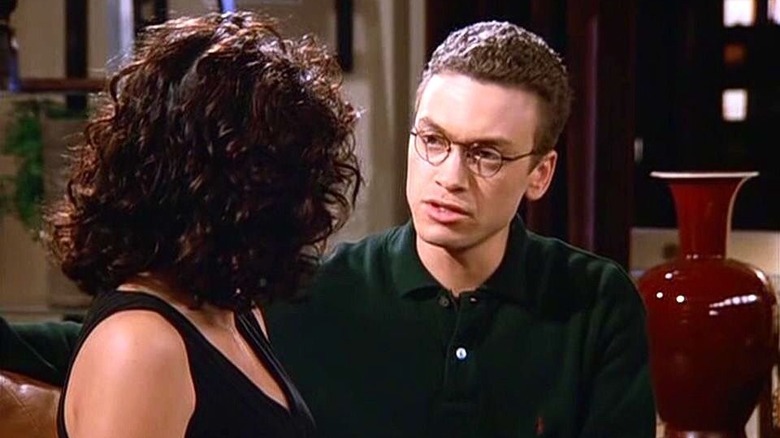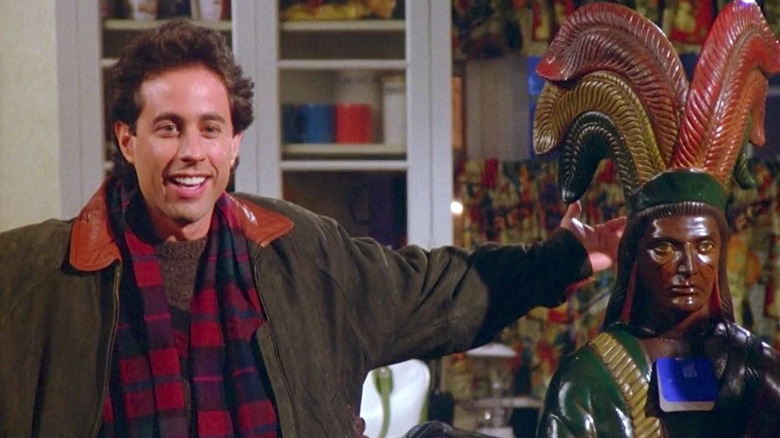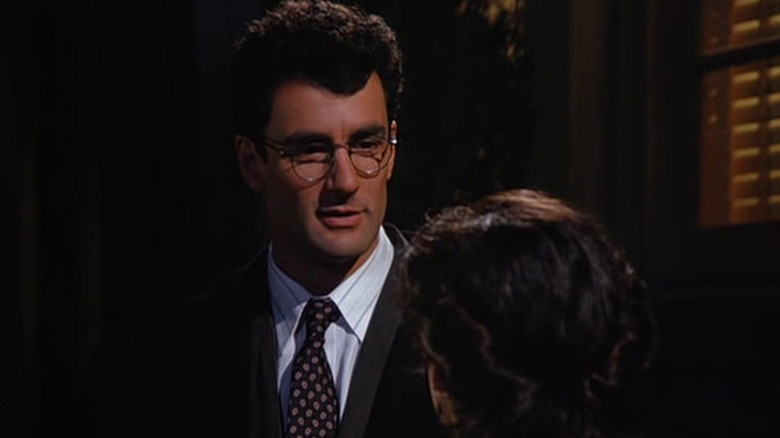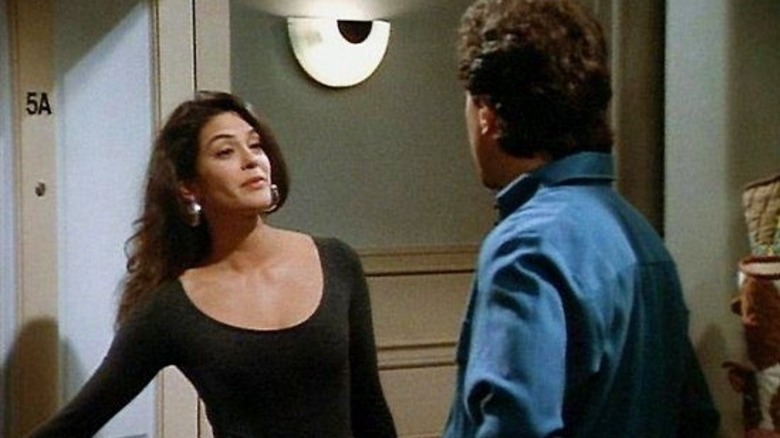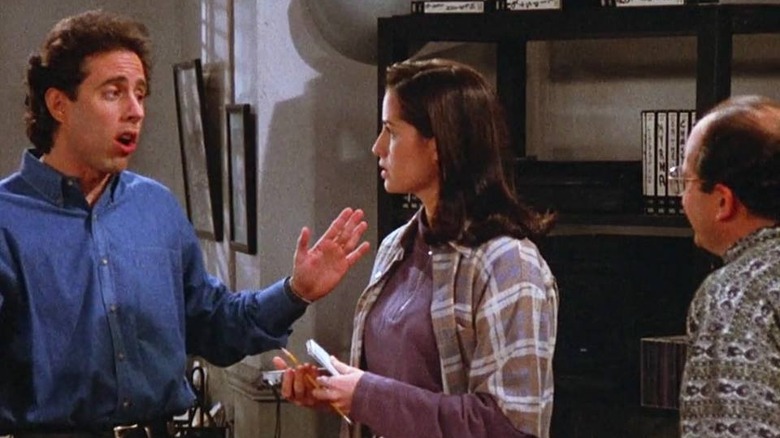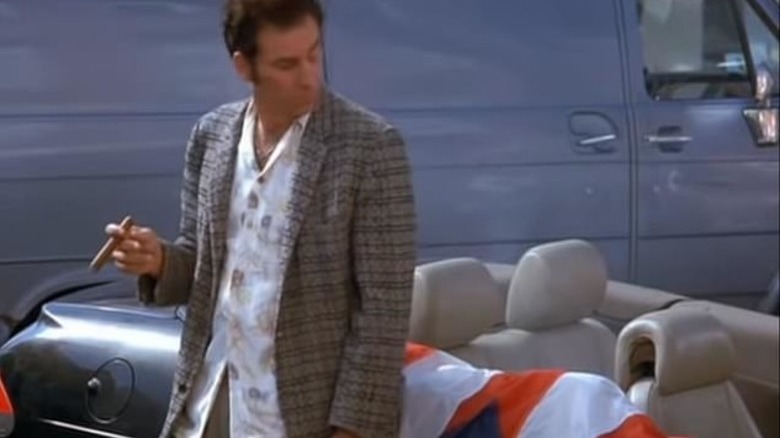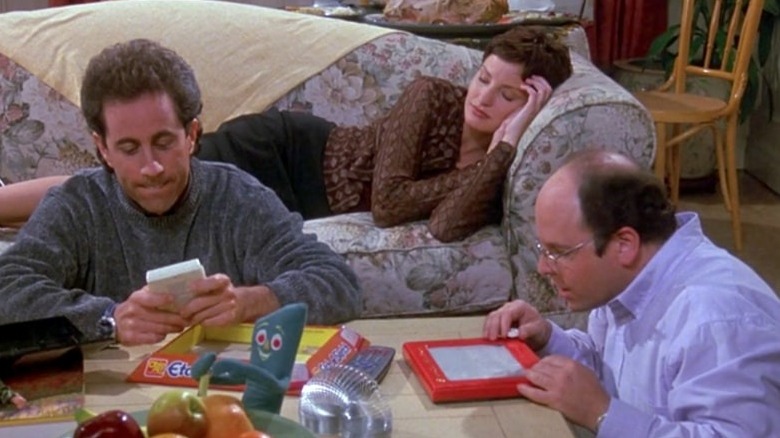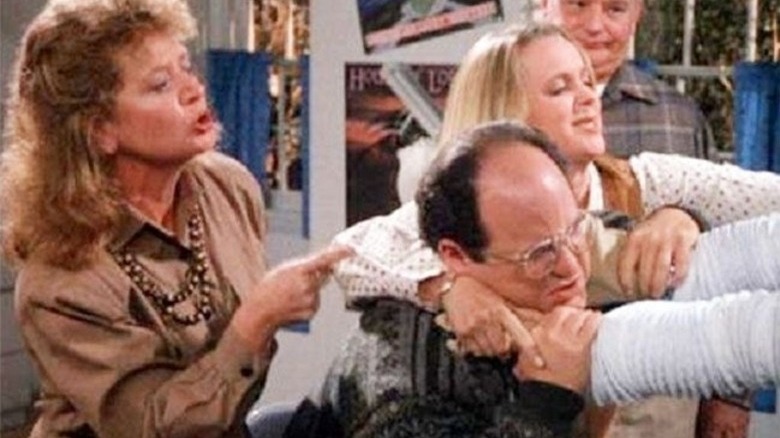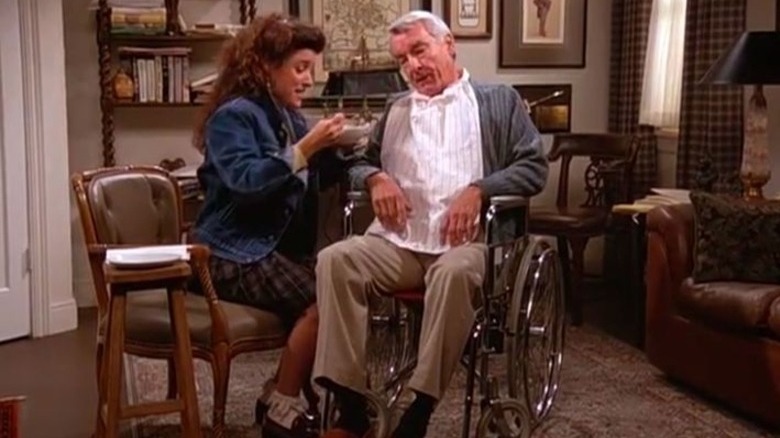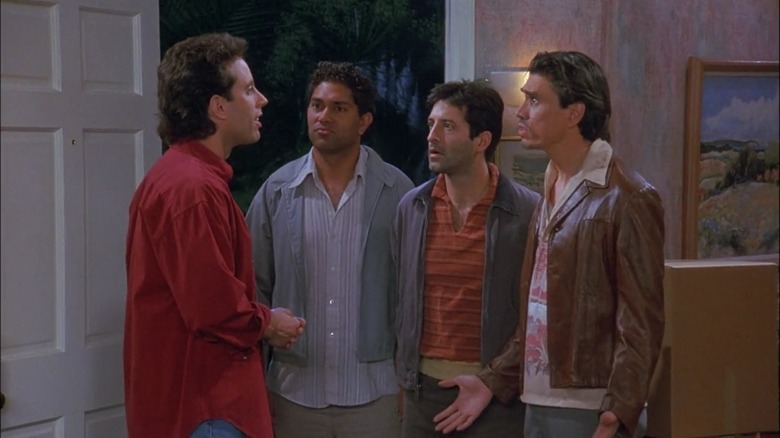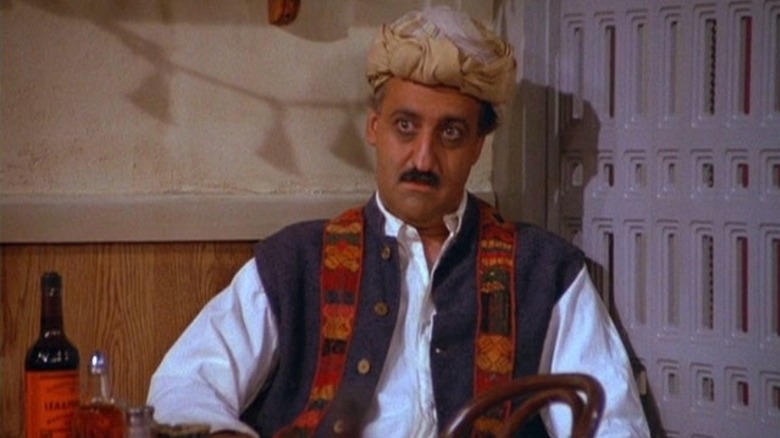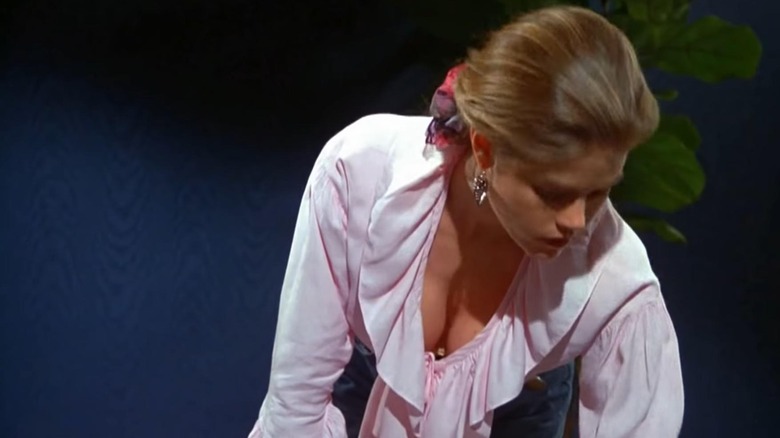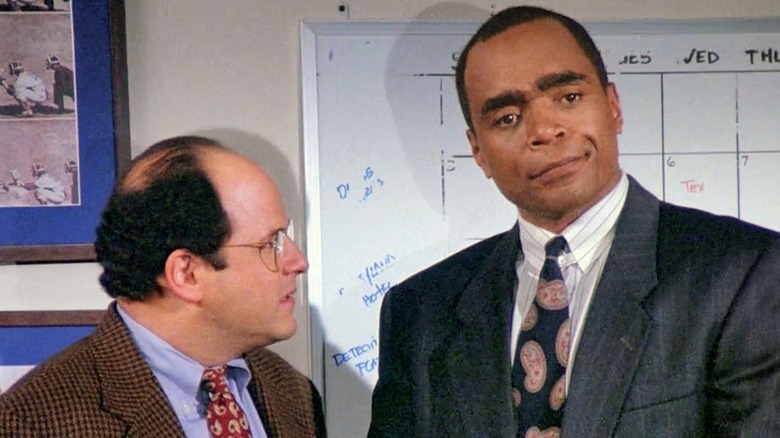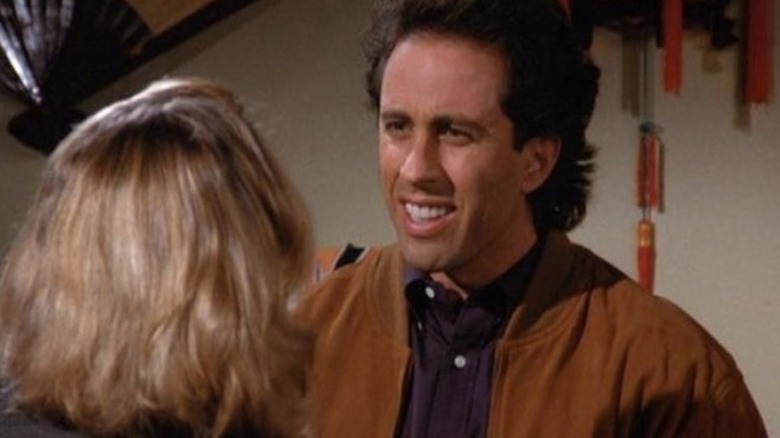Seinfeld Moments That Haven't Aged Well
Everybody knows that "Seinfeld" was about four unrepentant jerks who often acted in ways completely inappropriate for civilized society. But audiences loved Jerry, George, Elaine and Kramer, so they hung in there — week after week, season after season, laugh after laugh, to record ratings that remain formidable in syndication and streaming decades later.
So admittedly, it's a bit redundant to publish a list of "Seinfeld" moments that haven't aged well, because many of them didn't play well the night they first aired on NBC; that's the way the show was designed, much like another it begat: "Curb Your Enthusiasm."
Nevertheless, this show about nothing, undeniably one of the most popular sitcoms in the history of television, coiner of catchphrases and yada, yada ... had some moments that, well let's just say if anybody tried them today they'd likely get cancelled, put on a "No Fly" list, #MeToo'd, and/or just plain arrested. Re-watching "Seinfeld" now, you might find that some of it hasn't aged particularly well, especially storylines featuring racism, sexism, and other offensive scenarios that, for many, are just super-uncomfortable to watch today.
Sure, Jerry, Elaine, George, and Kramer — and on a meta level, Larry David, Jerry Seinfeld and everyone else behind the "Seinfeld" scenes — would undoubtedly laugh at the notion of an article like this, offering a snarky remark and a reminder that the best humor (and an invaluable life necessity) comes from laughing at things society takes seriously. Nevertheless, it's hard to dispute — these "Seinfeld" moments have not aged well.
When Elaine didn't know her boyfriend's race
In the fifteenth episode of Season 9, entitled "The Wizard," Elaine dates a guy named Darryl (Samuel Bliss Cooper). When she introduces him to George and Jerry, they make a comment about how she's dating a Black man, but Elaine didn't have any idea that Darryl was Black. But actually, is Darryl Black? They're all too uncomfortable to ask. Elaine continues the relationship until Darryl makes a comment about how someone must have treated them poorly because they're in an "interracial relationship." But she soon realizes that Darryl thinks they're an interracial couple because he assumed she was Hispanic. They eventually break up, after realizing they're just a couple of boring white people.
This whole scenario wouldn't fly today. Not only is it offensive to assume someone's race just by looking at them, it's also a little weird that Jerry, Elaine, and George would care so much. Sure, Elaine is trying to look more progressive by dating a Black man — but that's just the kind of behavior, as a show of solidarity or woke-ness rather than actually being interested in the person, that makes it so problematic. Which isn't to say Elaine was the only person in the wrong here, as Darryl made similar assumptions about Elaine.
When Jerry tries to date a Native American woman
Here's another dating scenario with questionable race issues. In the tenth episode of Season 5 ("The Cigar Store Indian"), Jerry brings Elaine a "cigar store Indian" statue as a "peace offering" while she's with her friend Winona. Jerry had been interested in Winona for a while, but when he brings the statue to Elaine and makes Native American whooping noises, Winona reveals that she's Navajo — and incredibly offended. Jerry offers to make it up to her by taking her out on a date, but their date doesn't go well, because Jerry seemingly asks an Asian mail carrier if he knows any good Chinese restaurants in the area. Kramer then drives by with the statue in a cab next to him, making his own offensive "Indian" noises.
The whole episode not only represents Winona as being overly sensitive, but it leaves Jerry as the sad white guy who was trying to connect with a Native woman but just kept making mistakes that dug him into a deeper and deeper hole. The seriousness of the subject matter doesn't lend itself well to attempts at comedy, but Jerry's bumbling "well, I tried!" attitude makes things worse, coming across as smug and out of touch.
When Elaine tries to turn a gay guy
Season 6, Episode 16 of "Seinfeld" has a truly hilarious setup of George in a toupee rejecting a bald woman, and a great piece of physical comedy with Elaine stealing the hideous hair piece. But the episode, appropriately titled "The Beard," also has a storyline that the LGBTQ+ community would likely find unacceptable today.
Elaine agrees to go to the ballet with her friend Robert (Robert Mailhouse), whom she believes is gay, to act as a "beard" for him for the benefit of Robert's conservative boss. But on the date, Elaine develops a crush, and wonders if she can "turn" Robert straight. Jerry advises = against this, saying that gay men "are only comfortable with their own equipment."
Nevertheless, Elaine tries to achieve her goal, and even seems to "succeed" for a few scenes — until Robert eventually goes back to being gay. The whole premise of trying to turn a gay person straight through seduction is the sort of thing that fueled harmful "conversion therapy" attempts for decades, and as funny as "The Beard" might be, it reinforces the idea that being homosexual or bisexual is just a phase that can be "fixed." Such a notion seems harmful at best, and perhaps downright homophobic.
When Jerry tries to figure out if a woman has breast implants
Season 4, Episode 19 ("The Implant") is one of the most famous "Seinfeld" episodes, and also undoubtedly in the running for TV comedy's greatest last line: "They're real ... and they're spectacular." But boy, is that episode a weird watch today.
In "The Implant," Elaine and Jerry meet a woman named Sidra (Teri Hatcher) at the gym, and Elaine makes a comment about how her breasts are too perfect to be real. After taking Sidra on a date, but balking at the idea of dating a woman with breast implants, Jerry enlists Elaine to spy on Sidra in the sauna and Elaine does so, taking a peek at Sidra's naked torso. But Elaine trips in the sauna and lands with her hands on Sidra's chest. After that, Elaine asserts that they are, in fact, real, and Jerry asks her out again. After discovering their little ploy, Sidra dumps Jerry with the famous line.
The whole thing is just downright creepy. From the judgment of what women choose to do with their bodies from Jerry to Elaine's creepy stalking, this episode waders into a true grey area. It's a scenario that would not fly today, and it's hard to imagine that any show — no matter how highly rated — could air a similar storyline.
When Jerry gets outed
Along with "They're real and they're spectacular," another famous "Seinfeld" line that persists to this day is, "Not that there's anything wrong with that," in reference to being gay. In Season 4, Episode 17 ("The Outing"), an NYU student interviewing Jerry misconstrues Jerry and George's relationship as homosexual in nature, effectively "outing" Jerry in the student newspaper, which then gets picked up by larger outlets. Jerry and George quickly try to "save" their reputation by asserting that they're straight, while also cushioning their defense with the aforementioned line, "not that there's anything wrong with that."
Jerry and George try to have their cake and eat it too, defending their sexual orientation for fear of being perceived as gay, while also trying not to be perceived as homophobic or intolerant. Jerry and George's reaction just reeks of gay panic, yet they're still trying to be viewed as progressive by hammering down on the reporter that they think it's ok to be gay. Not that anyone needs Jerry and George's permission to be homosexual. Additionally, the very concept of "outing" someone these days has dire consequences, and the whole situation just hasn't aged well.
When Kramer stomps a Puerto Rican flag
The Season 9, Episode 10 of "Seinfeld" ("The Puerto Rican Day") is so notoriously bad that it landed itself in the very last position in Vulture's complete ranking of every "Seinfeld" episode. Due to the city's Puerto Rican Day Parade, the gang gets caught in a ton of traffic on their way home from a Mets game. Shenanigans take place, but the big offensive moment comes when Kramer accidentally lights a Puerto Rican flag on fire and tries to stomp it out.
The episode has not aged well, but it was also quite scandalous when it first aired back in 1998. National Puerto Rican Coalition president Manuel Mirabal criticized the episode, saying: "It is unacceptable that the Puerto Rican flag be used by 'Seinfeld' as a stage prop under any circumstances."
NBC decided to not rerun the episode, with executive vice president for broadcast standards and content policy Rosalyn Weinman saying in a statement: "We believe the comedy was aimed, as always, squarely at our own characters' ridiculous, misguided behavior, not at the Puerto Rican community ... Nevertheless, we are sorry if you were offended."
Writers Steve Koren and David Mandel defended the episode in a Season 9 DVD commentary, saying they could have moved the episode's parade to any New York heritage parade without changing most of the dialogue — and in 2002, distributor Sony Pictures Television began reinserting "The Puerto Rican Day" into syndication packages.
When Jerry drugs his girlfriend
Season 9's sixth episode is named "The Merv Griffin Show," for a premise revolving around Kramer discovering the old "Merv Griffin" talk show set in a dumpster and turning his apartment into a makeshift studio. That portion of the episode is funny enough, with Kramer interviewing his friends and playing host. But the side plot, about Jerry's girlfriend Cecile, is another matter entirely.
Cecile has a huge collection of rare and vintage toys, but won't let Jerry play with them. So he takes her out to a big dinner of turkey and wine, hoping that the combination of tryptophan and alcohol knocks her out. He then lets George in, and the two play with all the toys together like little boys. In another instance, Elaine joins them to play with an Easy-Bake Oven.
The premise of practically drugging a woman to sleep so several people can do something without her consent is unbelievably uncomfortable. While it's played for laughs, the subplot does not read well these days, particularly after the #MeToo and #TimesUp movements have highlighted the need for clear, unequivocal consent.
George pops the Bubble Boy
Season 4, Episode 7 ("Bubble Boy") revolves around taking a trip to a cabin owned by the parents of Susan, George's fiancee.
On the way, Jerry promises to visit a young fan named Donald, who lives in a bubble. But the boy turns out to be a grown man, so anemic he had to live in quarantine with his parents. He's angry, jaded, and emotionally abusive. George and Susan get to the Bubble Boy's house first, where George quickly enrages him by playing a game of Trivial Pursuit. Bubble Boy reaches out to strangle George through the arm holes in the bubble, and George fights back. His bubble pops in the scuffle, and Donald has to be taken away in an ambulance — just as a confused Jerry and Elaine arrive.
While a disgruntled grown man living with his parents can be pretty funny, the "Bubble Boy" scenario could be seen as ableist and derogatory to those with disabilities in this day and age. Donald's fragile emotional status, as the result of his confinement, is something we could all perhaps relate to after the COVID-19 pandemic — but that would probably also make audiences all the more upset that it's played for laughs.
Woody Allen and other older men
There are a couple of reasons why "The Alternate Side" (Season 3, Episode 11 ) wouldn't work today. To start out, the main storyline revolves around Kramer getting a bit part in a Woody Allen film. He has a single line: "These pretzels are making me thirsty." But he botches it, again and again, and then gets fired from the film after breaking a glass, some of which hits and injures Allen.
For starters, if they made this episode today, they'd probably need to reference another director. Sure, Woody Allen played well at the time because he was seen as the quintessential New York filmmaker and was putting out a movie a year in those days, so it was quite conceivable that he'd be shooting in the neighborhood of the gang. But although the allegations against Woody Allen supposedly occurred in the early '90s, and his relationship with Soon-Yi Previn became public in 1992 — and "The Alternate Side" aired in 1991, right as it was all emerging — he continued making films for several more decades, with the controversy surrounding Allen only reaching an apparent tipping point in recent years, rendering him a third rail that no primetime comedy would dare touch.
Further complicating matters, this episode also features Elaine dating a much older, wealthier man, the 66-year-old author Owen March. At first their relationship is going fine, but just as Elaine decides to break up with him, he suffers a stroke and becomes paralyzed. Elaine feels bad for wanting to dump him, but the whole thing just comes off as Elaine being a gold digger to a creepy older guy. Then, when he's incapacitated, his disabilities are played for more laughs, and you just kind of feel awful that Elaine abandons him.
When Kramer buys some Cubans
Racism aside, the premise behind "The English Patient," the 17th episode of Season 8, is pretty funny. Elaine goes to see the popular movie "The English Patient" with her boyfriend and hates it. As a result, he dumps her. When she's forced to go with her boss J. Peterman, she can't take the melodramatic, stuffy, overlong film anymore and has a meltdown in the theater. The physical comedy is great here; Elaine's intense desire to just go see the silly "Sack Lunch," and her intense distaste for the 1996 Ralph Fiennes/Juliette Binoche period drama, make for a really funny episode.
But there is a pretty bad subplot here, however, about Kramer ordering some "Cubans" from Florida. What he meant to do was order cigars, but when they arrive, they are actually human Cubans.
Kramer puts them to work, rolling cigars in a quasi-sweatshop environment, only to find out that they're actually Dominicans pretending to be Cubans. Ethnic identities, stereotypes, and problematic immigration issues abound in this episode that hasn't aged particularly aged well. It's a shame, since Elaine's "English Patient" drama is hilarious.
Poor Babu Bhatt
"Seinfeld” wasn't the kindest with its portrayal of immigrants, as is evident in Season 3, Episode 7's "The Cafe." This episode marks the first appearance by Babbu Bhatt (Brian George), an immigrant from Pakistan with a cafe across from Jerry's apartment that is frequently empty. In a typical white-savior style, Jerry offers him the advice to turn his restaurant into a Pakistani cafe and serve the food of his home country. Babu does so, but he still has no customers, and eventually has to close his restaurant down.
Jerry, inserting himself into Babu's business and financial life, doesn't come across very well anymore. He seems like he's trying to help, but these days a white guy inserting his opinion into the business and life of an immigrant of color feels cringeworthy. Babu also comes across as kind of a caricature, and when Jerry accidentally gets him deported, it's supposed to be hilarious. Not only that, but Jerry's line of "from here, I could probably shoot him. I'd be doing both of us a favor," comes off as hugely insensitive given the frequency of mass shootings America has experienced since the 1990s.
When George ogles a 15-year-old
By its fourth season, "Seinfeld" was a major hit — so much of one, in fact, that storylines began getting meta, referencing the creation of a show about nothing.
In the episode "The Shoes" (Season 4, Episode 15), an NBC executive's 15-year-old daughter comes into his office in a low-cut top. George can't stop staring at her cleavage, which gets him kicked out, putting their TV show in jeopardy.
It would never fly today to have a main character of a comedy TV series ogling someone so young, and it would be doubly bad if that main character then made excuses about it as bad as "they were in my field of vision." What's worse is that the gang then uses Elaine in a low-cut dress to convince the honcho that this can be distracting, putting all of this skeevy pressure on women to keep their body parts out of men's faces, lest they do something stupid.
When George tries to find a Black friend
Just a big fat yikes to Season 6, Episode 22 ("The Diplomat's Club"), which begins with George offending his new, Black boss by telling him he looks like Sugar Ray Leonard, to which the man replies: "I suppose we all look alike to you?"
So, George goes out of his way to try and prove he isn't racist. How does he do this? He goes around trying to find a Black friend. He stops random black people on the street, asking them to be his friend. Eventually he tries Joe, the guy from the Season 6 episode "The Couch," invading the man's movie night with his daughter. Super awkward. Joe obviously objects, so George next tries the exterminator from earlier in the season, Karl.
George brings Karl to dinner with his boss, but his ruse is quickly discovered and George's boss storms off. The whole thing is so cringeworthy, perpetuating the idea that if someone has a Black friend they can't possibly be racist. "Seinfeld" was a pretty white show for its entire run, and these dabbles with racism and how white people behave when confronted with race issues have aged very poorly.
Jerry's really into Asians
When George's phone lines get crossed with a woman who has the last name Chang, Jerry just assumes that she's Chinese, so he sets up a date. He tells Elaine that he likes Asian women, and she says, "Isn't that a little racist?" he replies, "It's not racist if I like them." This is followed by some Confucius jokes, some jokes about mixing up the letters L and R, and a whole lot of stereotypes. When Jerry finally meets Donna, it turns out that she's a white lady who shortened her last name from Changstein.
Jerry's Asian fixation is the exact kind of creepy infatuation that Asian women have been fighting for centuries, so it doesn't help that "Seinfeld" is also feeding into racist Orientalism. When Donna offers George's mom some advice over the phone by citing Confucius, Mrs. Constanza takes the advice, thinking Donna is Chinese. But much like Jerry, Mrs. Costanza reverses course when she learns Donna isn't Chinese, rendering her advice invalidated.
All said, "The Chinese Woman" (Season 6, Episode 4) is a really uncomfortable episode to watch, anchored by a scenario that hasn't aged well — especially when you consider the increased amount of hate crimes against Asian Americans in recent years.
